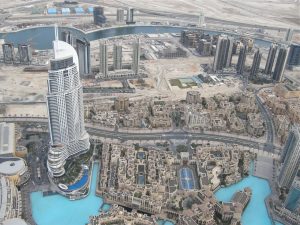 A renewed threat of recession in Europe would certainly have an impact on Dubai’s economy, though a greater flexibility developed in recent years will help the emirate weather out the storms.
A renewed threat of recession in Europe would certainly have an impact on Dubai’s economy, though a greater flexibility developed in recent years will help the emirate weather out the storms.
Though it has further transformed and strengthened its economy by rationalizing investments, Dubai is still receptive to global economic downturn, as it was in 2008. This is mainly due to the significance of financial, tourism and trade sectors as the emirate’s leading GDP contributors.
Despite mounting concerns over the global economy, Dubai appears to be entering in the 2012 with renewed optimism, with the government announcing numerous investments aimed at strengthening growth. Under the 2012 budget, approved by Sheikh Mohammed bin Rashid Al Maktoum in December last year, 41% of all emirate expenditures will be channeled towards infrastructure, transportation and economic development projects, with a further 29% to be spent on health care, education, housing and culture.
Most notable, the budget also forecasts a sharp decrease in the deficit for 2012, with the revenue deficit projected at just around $500m, more than 50% less than in the past year. Total expenditures for 2012 have been set at $8.79bn, while income is projected to come in at $8.29bn. This significant change from the higher deficits of the past few years is expected to further rebuild investor sentiment and stimulate growth.
The 2011 was a year of consolidation for Dubai. Some key economic sectors demonstrated solid growth. Few of the emirates leading corporations sharply reduced debt load. Consumer’s confidence grows at steady pace, though concerns remain over how renewed economic recession in Europe will impact the emirate’s still fragile economy.
The continuous economic recovery should be supported by maintaining low inflation levels during 2012. As of the end of November last year, consumer inflation was standing at around 0.2%, having remained at below 1% for almost all of the past twelve months. With the emirate’s property market still on the downsite, rental costs continued to be low, taking a main factor out of the inflationary balance. With the costs of food, transportation and services gradually on the rise, the figures are expected to increase in 2012.
Though a emerging prospect of recession in some parts of the world will affect the global travel and tourism industry, Dubai would remain relatively safe. According to latest released figures, passenger numbers at Dubai International Airport jumped by 8.9% by the end of December, with more than 4.4m travellers using the facility. The estimates for the traffic during the complete year are rounded in the range of 50 million passengers.
The surge in passenger traffic at the Dubai International Airport reflects the regained strenght of the emirate’s tourism industry. According to data released by TRI Hospitality Consulting in middle of December 2011, occupancy rates at the city’s hotels have came back to the boom levels of 2007, prior to the financial crisis. Dubai’s occupancy rates hit 87.3% in October 2011, with revenue per room leaping 13%. The strong growth is accredited to an increase in tourist and business travel activity, as well as an influx effect of the Arab Spring. Many travelers looking for an alternate destination for work or holidays amidst the regional civil unrest opt for Dubai.
The debt obligations of some state-supported companies is still significant, but it is far more manageable than it was in the wake of the financial crisis. With the economy regaining the dynamics of the pre-crisis times, 2012 could turn out to be a year of measurable growth.


































